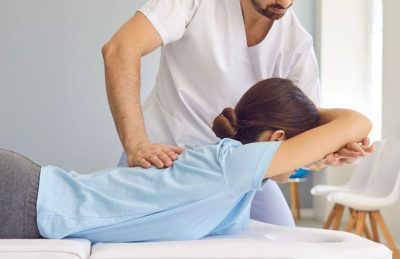Osteopathy
Holistic approach that emphasizes the body's ability to heal itself
What is Osteopathy?
Manual osteopathic treatment is a holistic and non-invasive approach focused on enhancing body’s overall well-being. Practitioners use hands-on techniques, including massage, stretching, and joint mobilization, to address specific issues while considering the body as a whole. This comprehensive method aims to relieve pain, improve mobility, and support the body’s natural self-regulating abilities. By promoting balance and harmony within the body, manual osteopathic treatment can be effective for a variety of conditions, helping individuals achieve better health and function.

Key Principles of Osteopathy
- Holistic Approach: Osteopathy considers the whole person, not just specific symptoms. It looks at how different systems (musculoskeletal, nervous, and circulatory) interact and influence each other.
- Self-Healing: Osteopathy believe in the body’s inherent ability to heal. Their goal is to support this process by removing barriers to health.
- Structure and Function: The principle that structure and function are interrelated is fundamental in osteopathy. By addressing physical alignment and balance, practitioners aim to improve overall health.
- Manual Techniques: Osteopathy use a variety of hands-on techniques, including stretching, massage, and manipulation, to treat and prevent conditions.
Common Conditions Treated
- Musculoskeletal Pain: chronic pain, back pain, neck pain, hip pain, knee pain, joint issues, arthritic pain, sciatica, and sports injuries.
- Headaches and Migraines: Osteopathy can help alleviate tension and improve blood flow.
- Digestive Issues: Techniques may relieve tension in the abdominal area, supporting digestive function.
- Stress and Anxiety: Osteopathic treatment can promote relaxation and help with emotional well-being.
Techniques Used
- Massage: Various massage techniques help relax muscles, improve circulation, and reduce tension.
- Stretching: Gentle stretching can enhance flexibility and range of motion, aiding in the relief of stiffness.
- Joint Mobilization: Controlled movements are applied to joints to restore proper function and improve mobility.
- Myofascial Release: This technique targets the fascia (connective tissue) to relieve tension and enhance movement.
- Cranial Osteopathy: A gentle technique that focuses on the skull and its influence on the central nervous system.
Benefits of Osteopathy
- Pain Relief: Many patients find significant relief from chronic pain and tension through osteopathic treatments.
- Improved Mobility: By addressing restrictions in the musculoskeletal system, osteopathy can enhance movement and flexibility.
- Enhanced Circulation: Techniques used in osteopathy can improve blood flow and promote better oxygenation of tissues.
- Overall Wellness: Osteopathy encourages a greater awareness of one’s body and health, often leading to improved lifestyle choices.
- Preventive Care: Regular osteopathic treatments can help prevent injuries and promote long-term health by maintaining balance and alignment.
What to Expect During a Session
- Initial Assessment: The osteopath will conduct a thorough evaluation, including a medical history and physical examination.
- Personalized Treatment: Based on the assessment, a tailored treatment plan will be developed, which may include various manual techniques.
- Follow-Up: Ongoing assessments and treatments may be recommended to monitor progress and adjust the plan as needed.
Growing Popularity
- Increased Awareness: As more people seek alternatives to traditional medicine, osteopathy is becoming a recognized option for holistic care.
- Integration with Other Healthcare: Osteopathy is often integrated into broader healthcare practices, working alongside conventional treatments to enhance overall wellness.
Experience the Beauty of Holistic Wellness
Osteopathy can be a valuable addition to your healthcare routine, promoting holistic wellness and addressing a variety of health concerns.